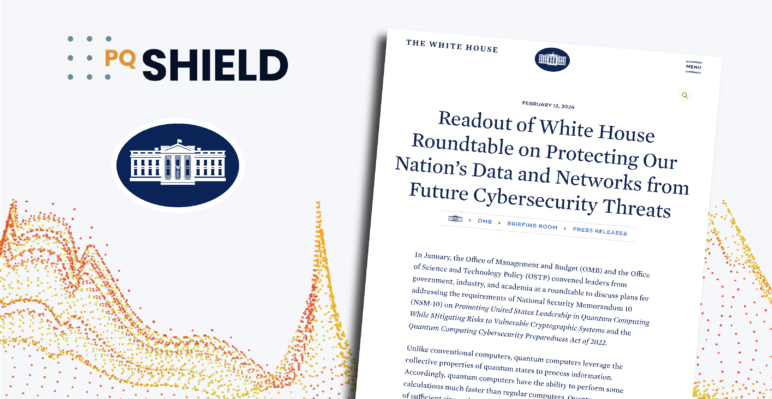
In January, our Senior Vice President, Ben Packman, and VP Product, Axel Poschmann, were privileged to be invited to the White House in person, in order to take part in a roundtable discussion hosted by the US Office of Management and Budget (OMB) and the Office of Science and Technology Policy (OSTP). Our CEO, Ali El Kaafarani, also attended by video call.
The aim was to gather leaders from government, industry, and academia to continue the discussion on migration to post-quantum algorithms, as outlined in both NSM-10 and the Quantum Computing Cybersecurity Preparedness Act of 2022. The legislation forms a key part of the US agenda to achieve resilience in the era of quantum computing, and to ensure federal agencies are planning, budgeting and preparing for the transition ahead.
The discussion centered on the prioritization of functions such as confidentiality and authenticity, and the post-quantum technologies underpinning them, such as ML-KEM and ML-DSA. An interesting takeaway was that the priority for these pillars of cybersecurity may well shift slightly depending on the sector in which they are being deployed – for example defense might prioritize confidentiality, whereas healthcare may have a slightly stronger focus on authenticity, given the wide ecosystem of users and devices.
Axel Poschmann summed up a general position: “Confidentiality is the strongest link, hence if you are 90% migrated to ML-KEM you are probably fine. Trust is the weakest link: if you are 90% migrated to ML-DSA you are still vulnerable”
Additionally, hybrid schemes (post-quantum plus classical) were discussed, including potential mitigations for their use, target dates for transitioning into and out of the hybrid phase, and standardizing the approach for use.
Hybrid schemes are treated differently by many international organizations, and it will become increasingly important to define common ground for identifying and deploying them appropriately as part of the push for crypto-agility.
The message from senior officials certainly seems clear. The discussion was timely, important, and focused on the value of strong encryption – the ‘last line of defense’ for national security and critical infrastructure. Participants at the roundtable echoed this importance and stressed the need for continued collaboration.
The full readout from the roundtable is available here: Find out more.
Link to Press Release

